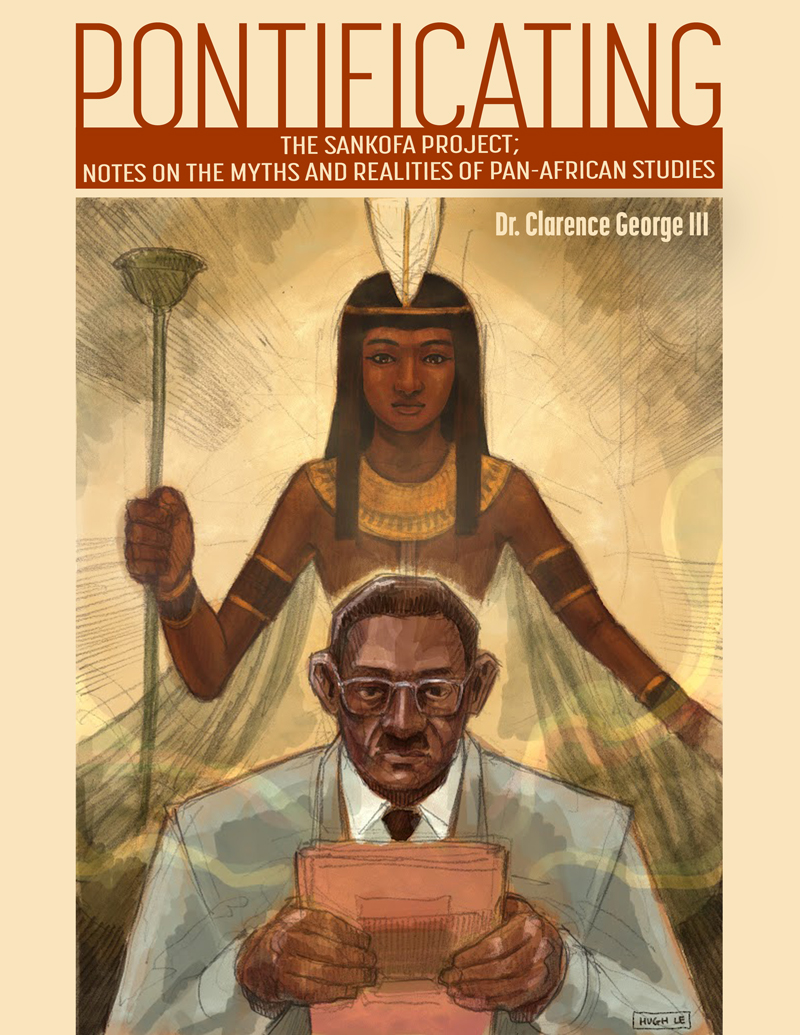Pontificating: The Sankofa Project; Notes on the Myths and Realities of Pan-African Studies
Author(s): Clarence George
Edition: 1
Copyright: 2024
Choose Your Platform | Help Me Choose
The Sankofa Project: Notes on the Myths and Realities of Pan-African Studies offers a deep and incisive analysis of the field, engaging critically with both its theoretical foundations and practical implications. It examines the historical narratives surrounding Pan-Africanism, thoughtfully unpacking its successes while interrogating its limitations in addressing the complex and varied experiences of the African diaspora.
This work is designed to expose scholars to essential theoretical frameworks, research methodologies, and pedagogical strategies within Africana, Pan-African, African American, and African Studies. It emphasizes the importance of interdisciplinary approaches, encouraging a holistic understanding of the Black experience across global contexts.
The unique historical trajectories of African-descended peoples have often placed them in educational systems that are ill-equipped to fully meet their needs. The legacy of systemic racism, discrimination, and marginalization has not only shaped educational institutions but has also perpetuated inequalities, presenting significant challenges for these communities. By shedding light on these issues, this book contributes to ongoing efforts to dismantle educational inequities and promote a more inclusive and equitable learning environment.
Forword
By Dr. Serie McDougal
Introduction
CHAPTER 1: Africa Myths and Realities: Philosophy Spirituality and Theory
CHAPTER 2: Africana Studies; From Protest to Progress in Academic Institutions
CHAPTER 3: A South African Case Study on African-Centeredness in Practice
CHAPTER 4: The Diaspora and Me
CHAPTER 5: The Problem at a PWI
CHAPTER 6: Ubuntu as Practice, Pedagogy, and Liberation
CHAPTER 7: Annotative Bibliography: Pedagogy and Practice
CHAPTER 8: Pontification and Pan-African Studies
Closing Thoughts on the Cosmic Assignment
Dr. Clarence George III is a trailblazing first-generation college graduate and graduate school student. Born in Stockton, California, he attended Franklin High School, where his academic journey began. Dr. George III has expanded his research to a global scale, particularly in the application of culturally relevant pedagogy. His research primarily focuses on Afrocentric pedagogy and African historiography, delving deeply into the educational frameworks and historical narratives rooted in African culture. Additionally, Dr. George III has a profound interest in classical civilizations, including the early civilizations of the Great Lakes region of Central Africa and the ancient Nile Valley civilizations, reflecting his comprehensive and multifaceted approach to understanding African history and pedagogy.
Dr. George III boasts an impressive academic background, holding a Bachelor's degree in Communication Studies from Sacramento State University, a Master's degree in Ethnic Studies from San Francisco State University, and a Ph.D. from Michigan State University in the Department of African American and African Studies. As a curriculum consultant, Dr. George has contributed extensively to the academic field through various publications. He serves as a faculty mentor in the Cooper-Woodson College Enhancement Program at Sacramento State University. This program, founded in 1990 under the leadership of Dr. Otis Scott, Chris Glen, and David Covin, stands as an Educational Equity, Pan African Student Retention initiative, dedicated to fostering academic success and equity among students.
Dr. Clarence G. III has made significant contributions to African-centered pedagogy and education through his scholarly work, activism, and leadership. Some key impacts of his work include:
Dr. George III has contributed to the theoretical underpinnings of African-centered pedagogy by exploring and expanding upon the philosophical frameworks that support culturally relevant education. His writings and research have helped to articulate the importance of centering African culture, history, and values within educational practices.
He has been instrumental in developing curricula that integrate African perspectives into various subject areas, ensuring that students of African descent see themselves reflected positively in their educational experiences. This includes promoting the inclusion of African history, literature, and contributions to science and technology.
Dr. George's advocacy efforts have fostered community engagement and support for African-centered education initiatives. He has worked to build partnerships between educational institutions, community organizations, and families to strengthen the implementation of culturally affirming educational practices. As a leader in the field, Dr. George III has mentored educators and scholars who are committed to advancing African-centered pedagogy. His leadership has inspired others to advocate for equity and social justice within educational settings, particularly concerning African-descended students.
Through his innovative approaches to teaching and learning, Dr. George III has demonstrated how African-centered pedagogy can transform educational outcomes and empower students. His work has influenced educators and policymakers to reconsider traditional educational paradigms and embrace culturally responsive practices. Overall, Dr. George III's contributions have contributed in advancing the understanding and implementation of African-centered pedagogy and education, ensuring that these phenomena continue to evolve and positively impact the educational experiences of students globally.
The Sankofa Project: Notes on the Myths and Realities of Pan-African Studies offers a deep and incisive analysis of the field, engaging critically with both its theoretical foundations and practical implications. It examines the historical narratives surrounding Pan-Africanism, thoughtfully unpacking its successes while interrogating its limitations in addressing the complex and varied experiences of the African diaspora.
This work is designed to expose scholars to essential theoretical frameworks, research methodologies, and pedagogical strategies within Africana, Pan-African, African American, and African Studies. It emphasizes the importance of interdisciplinary approaches, encouraging a holistic understanding of the Black experience across global contexts.
The unique historical trajectories of African-descended peoples have often placed them in educational systems that are ill-equipped to fully meet their needs. The legacy of systemic racism, discrimination, and marginalization has not only shaped educational institutions but has also perpetuated inequalities, presenting significant challenges for these communities. By shedding light on these issues, this book contributes to ongoing efforts to dismantle educational inequities and promote a more inclusive and equitable learning environment.
Forword
By Dr. Serie McDougal
Introduction
CHAPTER 1: Africa Myths and Realities: Philosophy Spirituality and Theory
CHAPTER 2: Africana Studies; From Protest to Progress in Academic Institutions
CHAPTER 3: A South African Case Study on African-Centeredness in Practice
CHAPTER 4: The Diaspora and Me
CHAPTER 5: The Problem at a PWI
CHAPTER 6: Ubuntu as Practice, Pedagogy, and Liberation
CHAPTER 7: Annotative Bibliography: Pedagogy and Practice
CHAPTER 8: Pontification and Pan-African Studies
Closing Thoughts on the Cosmic Assignment
Dr. Clarence George III is a trailblazing first-generation college graduate and graduate school student. Born in Stockton, California, he attended Franklin High School, where his academic journey began. Dr. George III has expanded his research to a global scale, particularly in the application of culturally relevant pedagogy. His research primarily focuses on Afrocentric pedagogy and African historiography, delving deeply into the educational frameworks and historical narratives rooted in African culture. Additionally, Dr. George III has a profound interest in classical civilizations, including the early civilizations of the Great Lakes region of Central Africa and the ancient Nile Valley civilizations, reflecting his comprehensive and multifaceted approach to understanding African history and pedagogy.
Dr. George III boasts an impressive academic background, holding a Bachelor's degree in Communication Studies from Sacramento State University, a Master's degree in Ethnic Studies from San Francisco State University, and a Ph.D. from Michigan State University in the Department of African American and African Studies. As a curriculum consultant, Dr. George has contributed extensively to the academic field through various publications. He serves as a faculty mentor in the Cooper-Woodson College Enhancement Program at Sacramento State University. This program, founded in 1990 under the leadership of Dr. Otis Scott, Chris Glen, and David Covin, stands as an Educational Equity, Pan African Student Retention initiative, dedicated to fostering academic success and equity among students.
Dr. Clarence G. III has made significant contributions to African-centered pedagogy and education through his scholarly work, activism, and leadership. Some key impacts of his work include:
Dr. George III has contributed to the theoretical underpinnings of African-centered pedagogy by exploring and expanding upon the philosophical frameworks that support culturally relevant education. His writings and research have helped to articulate the importance of centering African culture, history, and values within educational practices.
He has been instrumental in developing curricula that integrate African perspectives into various subject areas, ensuring that students of African descent see themselves reflected positively in their educational experiences. This includes promoting the inclusion of African history, literature, and contributions to science and technology.
Dr. George's advocacy efforts have fostered community engagement and support for African-centered education initiatives. He has worked to build partnerships between educational institutions, community organizations, and families to strengthen the implementation of culturally affirming educational practices. As a leader in the field, Dr. George III has mentored educators and scholars who are committed to advancing African-centered pedagogy. His leadership has inspired others to advocate for equity and social justice within educational settings, particularly concerning African-descended students.
Through his innovative approaches to teaching and learning, Dr. George III has demonstrated how African-centered pedagogy can transform educational outcomes and empower students. His work has influenced educators and policymakers to reconsider traditional educational paradigms and embrace culturally responsive practices. Overall, Dr. George III's contributions have contributed in advancing the understanding and implementation of African-centered pedagogy and education, ensuring that these phenomena continue to evolve and positively impact the educational experiences of students globally.




